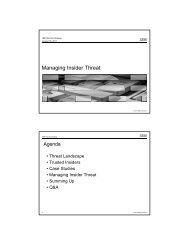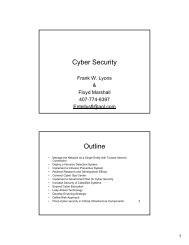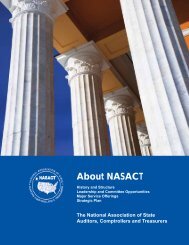Advisory Committee on Tax Exempt and Government Entities (ACT ...
Advisory Committee on Tax Exempt and Government Entities (ACT ...
Advisory Committee on Tax Exempt and Government Entities (ACT ...
You also want an ePaper? Increase the reach of your titles
YUMPU automatically turns print PDFs into web optimized ePapers that Google loves.
The Appropriate Role Of The Internal Revenue Service With Respect To <strong>Tax</strong>-<strong>Exempt</strong> Organizati<strong>on</strong> Good Governance Issues(7) Questi<strong>on</strong>s That Ask About Practices And Approaches Are Typically BetterThan Questi<strong>on</strong>s That Ask About Policies. One aspect of neutrality is to focus<strong>on</strong> the practices <strong>and</strong> approaches employed by a charity, as opposed to whether ithas adopted certain policies. As noted above, policies are not practices <strong>and</strong> badpolicies can lead to bad practices. Even where a policy has been adopted, thatpolicy may not be well c<strong>on</strong>ceived, the existence of a policy does not mean thatemployees <strong>and</strong> other c<strong>on</strong>stituencies are aware of or underst<strong>and</strong> the policy, <strong>and</strong>the policy may not be enforced in a manner that achieves its intended objectives.Moreover a poorly crafted policy or <strong>on</strong>e that the organizati<strong>on</strong> is not in a positi<strong>on</strong>to enforce can create liability. It also must be appreciated that the creati<strong>on</strong> <strong>and</strong>enforcement of a policy may be a significant burden to small charities or tocertain other types of charities, diverting critical financial <strong>and</strong> human resourcesaway from their charitable activities with little or no corresp<strong>on</strong>ding benefit.While we believe, <strong>on</strong> balance, that the governance questi<strong>on</strong>s <strong>on</strong> the redesignedForm 990 for 2008 are relatively neutral, we do have significant reservati<strong>on</strong>sabout the questi<strong>on</strong>s relating to the whistleblower policy <strong>and</strong> the documentretenti<strong>on</strong> <strong>and</strong> destructi<strong>on</strong> policy. Neither has an explicit relati<strong>on</strong>ship to the taxrules (we would, of course, feel otherwise if the document retenti<strong>on</strong> <strong>and</strong>destructi<strong>on</strong> policy focused <strong>on</strong> tax documents); while they may be important forcertain large organizati<strong>on</strong>s, they are likely to present an unnecessary burden forsmaller <strong>and</strong> certain other types of organizati<strong>on</strong>s; <strong>and</strong> hospitals (<strong>and</strong> perhapsother large organizati<strong>on</strong>s) typically have such policies in place <strong>and</strong> therefore d<strong>on</strong>ot need the IRS to encourage them to do so. 148 We also note that while theredesigned Form 990 asks about five different policies (gift acceptance,whistleblower, document retenti<strong>on</strong>, c<strong>on</strong>flict of interest, <strong>and</strong> joint venturearrangements), it attempts to c<strong>on</strong>firm adherence to the policies <strong>on</strong>ly in the lasttwo instances. The sample c<strong>on</strong>flict of interest policy included with the Form 1023instructi<strong>on</strong>s goes well bey<strong>on</strong>d the basics that would be appropriate for a smallorganizati<strong>on</strong>. 149 Moreover, the policy is less inclusive than <strong>on</strong>e would expect inthe case of many universities, hospitals, <strong>and</strong> large organizati<strong>on</strong>s, suggesting tothese organizati<strong>on</strong>s that the IRS sees no need for their more extensiveprotecti<strong>on</strong>s. 150148See supra Secti<strong>on</strong> VI.B. <strong>and</strong> infra Health Care Appendix 3.149See, e.g., supra note 142.150For example, the sample policy applies <strong>on</strong>ly to a “director, principal officer, or member of a committee with governing boarddelegated powers.” Many universities, hospitals, <strong>and</strong> large organizati<strong>on</strong>s subject all employees, or employees at the director levelor higher, to their c<strong>on</strong>flict policy. Putting aside the lack of clarity as to what c<strong>on</strong>stitutes a “principal officer,” in many largeorganizati<strong>on</strong>s senior managers other than the president (or possibly the chief financial officer <strong>and</strong>/or chief operating officer) are not“officers” within the meaning of state law, which requires that they be so designated in the organizati<strong>on</strong>’s governing documents.Many other pers<strong>on</strong>s who might c<strong>on</strong>stitute “disqualified pers<strong>on</strong>s” or “insiders” also would not be included. While the sample policymay be broader in some respects from excellent forms of c<strong>on</strong>flict of interest policies, it also may be narrower in other respects. Forexample, such policies might speak to c<strong>on</strong>flicts involving use of organizati<strong>on</strong> informati<strong>on</strong> for pers<strong>on</strong>al benefit, soliciting for the benefitof, or otherwise assisting, another entity to the detriment of the organizati<strong>on</strong>, or usurping for pers<strong>on</strong>al gain an opportunity to thedetriment of the organizati<strong>on</strong>. We note, however, that Governance <strong>and</strong> Related Topics – 501(c)(3) Organizati<strong>on</strong>s, supra note 22,does state: “Organizati<strong>on</strong>s are urged to tailor the sample policy to their own particular situati<strong>on</strong>s <strong>and</strong> needs, with the help ofcompetent counsel if necessary.”ADVISORY COMMITTEE ON TAX EXEMPT AND GOVERNMENT ENTITIES (<strong>ACT</strong>) June 11, 2008 53













